
Featured Blog | This community-written post highlights the best of what the game industry has to offer. Read more like it on the Game Developer Blogs or learn how to Submit Your Own Blog Post
Seven Deadly Sins of Adventure Games
Why the core mechanics of adventure games caused the genre to die -- and how it is a good thing.

This blog post also appeared on The Astronauts website.
We know why adventure genre died, or, to be precise, when and how it committed suicide. But surely all the latest discoveries in design (the trinity of Presence, Immersion and Engagement, ludonarrative dissonance, PENS model, etc.) have shown adventure game creators the way, and modern point and clicks are much better than the old ones, right? Sadly, wrong.
With literally one exception, which I talk about at the end of this post, it seems like the adventure genre desperately wants to stay dead.
Before I talk about the latest example of the zombification of adventures, a quick word on my background. Most people know me as the Painkiller/Bulletstorm guy, and that’s cool, but I have actually made more adventures than shooters. My first ZX Spectrum games were adaptations of either regular books (“The Diary of Adrian Mole”) or Choose Your Adventure books (“Starship Traveller”), but perhaps my first three commercial games are more convincing…
1993: The Mystery of the Statuette (PC, Polish only)
1995: Teenagent (PC, Polish and English release)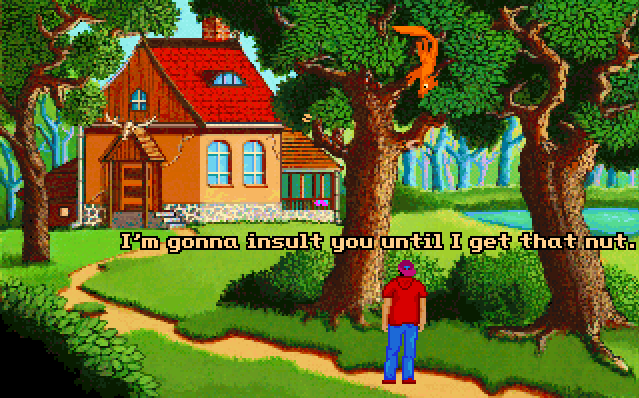
1998: The Prince and the Coward (PC, Polish and German release)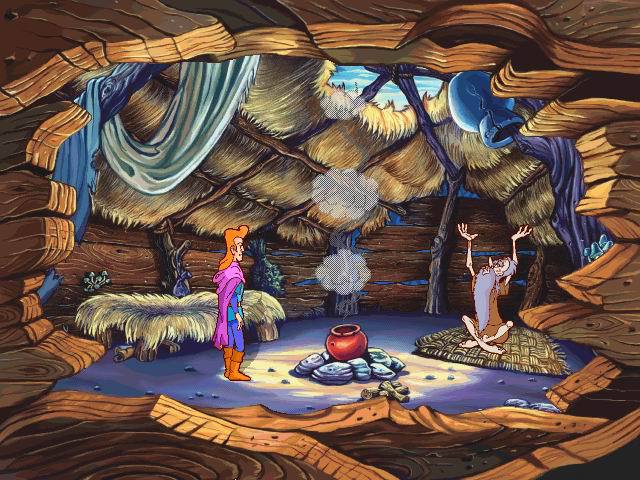
I mention this to make it clear that I do not only love adventure games, but I love them so much that I have dedicated many years of my life to their creation. So what I write about here comes both from the brain and the heart.
After this little detour, let’s get back on the main road.
Do you know who Jane Jensen is? I assume you do, but just in case, she’s the creator of the legendary Gabriel Knight series, and worked on many other fine adventure games.
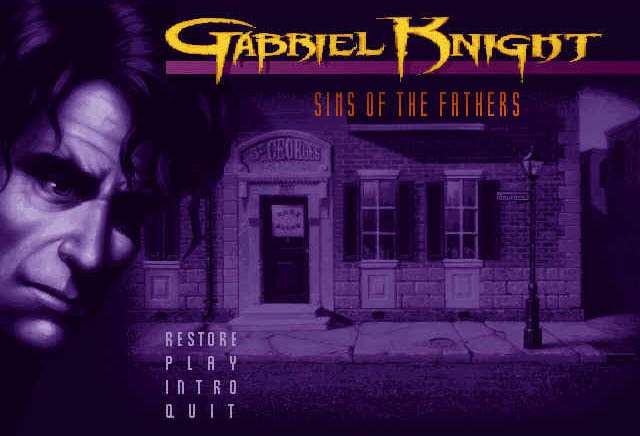
I don’t know if Gabriel Knight (the remake of which is coming soon) is a good game by today’s standards. But I know it was an amazing game in 1993, when the first part was released. I was so enchanted by the game that when a few years later I went to Munich in Germany to sign a deal for my own game, the highlight of the trip was visiting real life locations that I have seen earlier only through Gabriel’s eyes.
A few days ago, a new game from Jane Jensen was released: Moebius: Empire Rising.
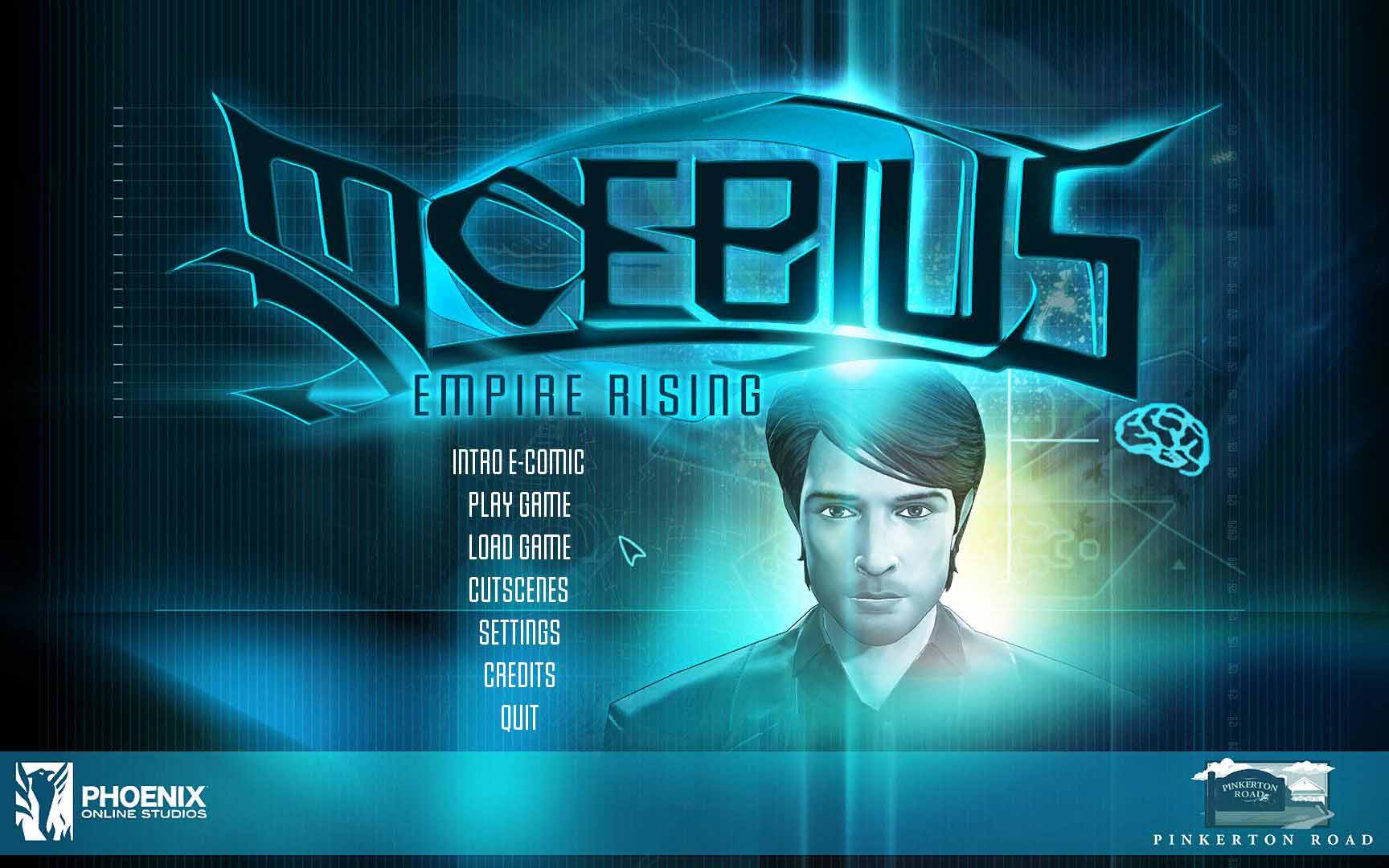
If only a few can make a good adventure game, the creator of Gabriel Knight series must be among them, right? Sadly, wrong again.
To be clear, I don’t want to make this personal. This is not about this or that creator. This is about the solutions 99.99% of adventure games creators use – and should not, as they ruin the experience.
Let’s take a look at the first seven minutes of Moebius and the seven sins of adventure games.
First Sin: Cinematic Wannabe
The game begins with movie-like credits. Movies have moved away from that a long time ago (e.g. Nolan movies don’t even feature the title anymore). At worst, something interesting happens when the credits are displayed: either something story-related, or something highly spectacular (e.g. the openings of Bond series). In the case of Moebius, it’s just a boring display of enigmatic visuals and names. That lasts for over three minutes. Yes, that’s how the game begins, with you staring for three minutes at something that tries to make you believe this is a “cinematic game” – whatever that means.
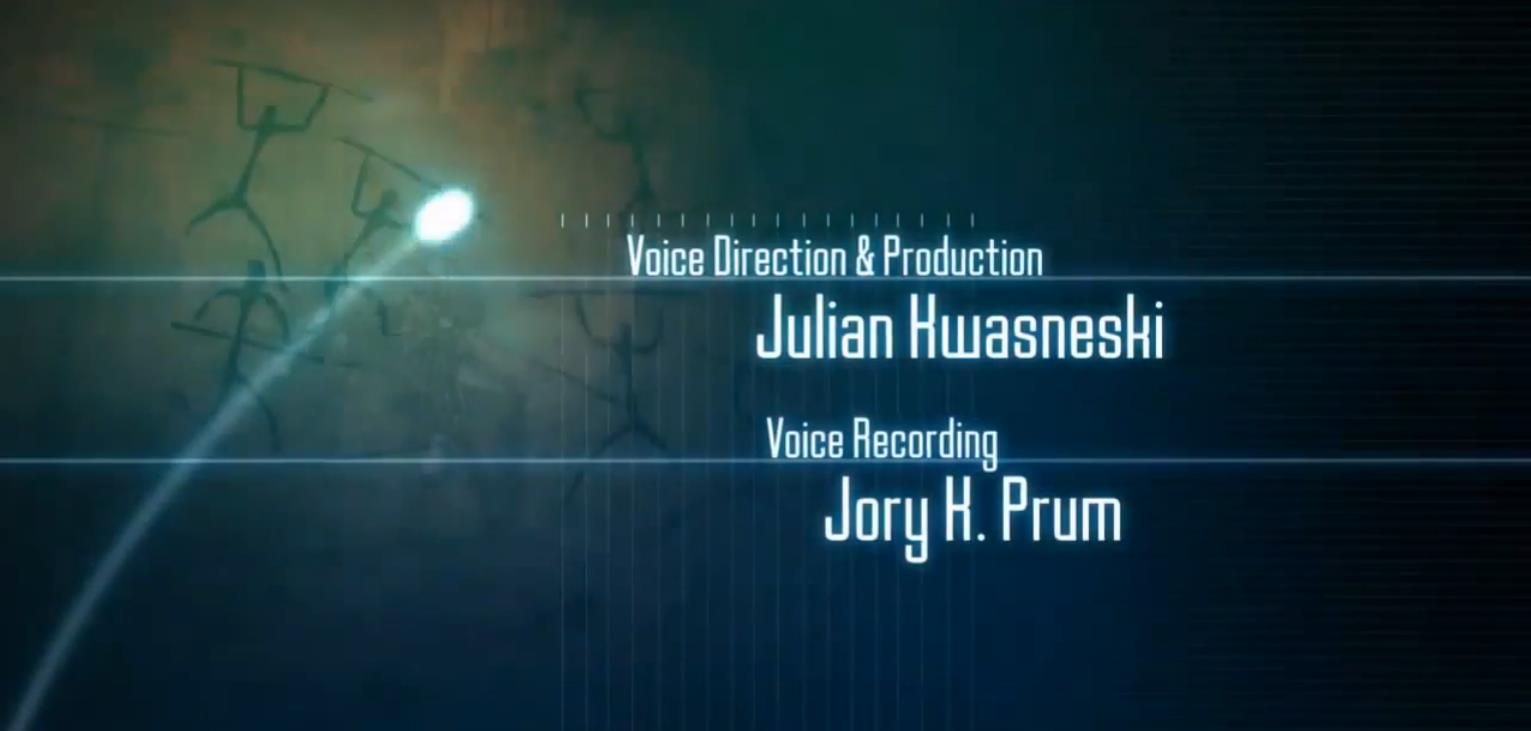
Actually, that’s not a sin exclusive to adventure games. I could name a good number of titles that force the credits into their openings. Developers: really, no one gives a damn. And those five guys who do, they can watch the credits on YouTube or go to Mobygames.
Of course, the “I’m not good enough to make movies, so I’ll make my games cinematic instead” syndrome that often plagues video games is not just about credits, and, on the other hand, there is nothing inherently bad about the “cinematic” word as such (The Walking Dead or Uncharteds are “cinematic” and that’s okay). It’s just that too many adventure games copy film techniques without deep understanding of how these things affect the game experience, and displaying credits in the intro is a good example of the problem.
Second Sin: Undisciplined Writing
The hero comes back from a business trip and talks to his assistant. Hero: “So, what’s the next assignment?” Assistant: “You just got here! You probably haven’t been to your penthouse yet.”
That tells me that the hero has a penthouse. The penthouse I can visit. The way the assistant talks about it suggests it’s a thinly veiled game hint: go to the penthouse first, and then we’ll see what happens.
In reality, there is no penthouse. You can never go there, and you never get to unpack that suitcase.
This is just an example; there are many more misleading pieces of dialogue and other unintentional red herrings in the game. Or in hundreds of other adventure games.
Third Sin: Lack of Internal Logic
The hero leaves the suitcase at his antique shop, and goes to see a certain man. When he accepts the job that the man offers, he can go straight to the airport and fly to Venice. Without the suitcase.
To make matters worse, you can actually go back to the shop before leaving for Europe, and say good bye to the assistant. That suitcase you just brought back from the trip to Africa will be standing there, untouchable, unpickable. Why doesn’t out hero need it? Nobody knows.
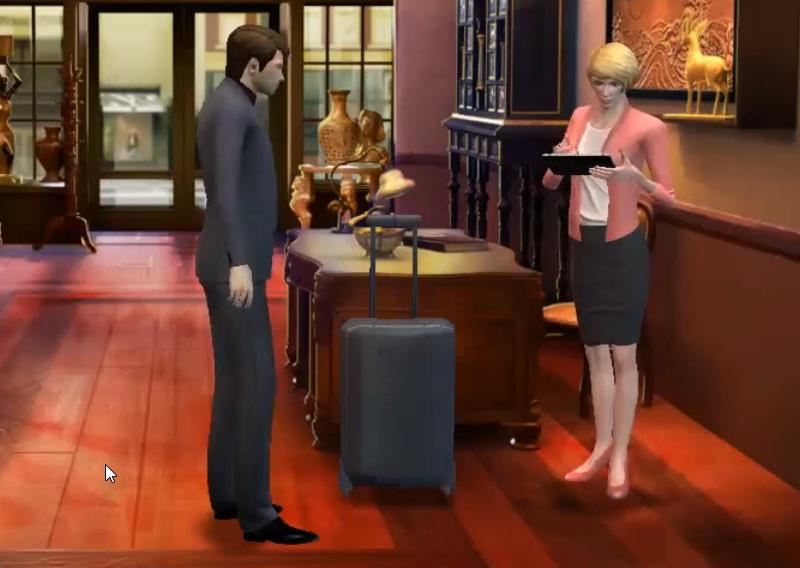
This may sound like a little thing, but it’s this attention to detail that makes or breaks an adventure game. The players like to feel a certain degree of freedom, and experimenting – especially when the experimenting makes sense – should always be rewarded. If I got back from a trip to a foreign country, and I have a packed suitcase, and I am about to leave for another foreign country, and I try to take that suitcase and the game tells me the suitcase is not important… That is nothing but a reminder that I am a puppet on a string, and not a hero of the story.
As always, this is just one example. The game suffers from the lack of internal logic in many other places. For example, you are not able to pick up even the most obvious items unless the hero “has a reason to do so”. This is not only terribly inconsistent (e.g. in the beginning I can take out a passport out of the suitcase just fine, even though there’s absolutely no reason to do so), but also simply translates to a lot of backtracking (once the “reason” is found).
Please note that I am not criticizing the lack of logic, but the lack of “internal logic”, i.e. the logic within the rules of the game world. Although, of course, the less abstract a game is, the more its “internal logic” resembles “real life logic”.
Fourth Sin: Useless Pseudo-Branching
I mentioned that the hero accepted a mission from a certain man. In reality, you can refuse to take on the job. The proposal comes from a shady man trying to send you on a shady mission for shady reasons, so the refusal is actually quite reasonable, especially considering that you also have two other exciting and legit jobs lined up.

Of course, that refusal means only one thing: you will not be able to progress in the game, stuck in a loop of meaningless activities until you say “yes”. So, at the end of the day the option to refuse is merely another reminder that you mean nothing in the game.
The branching in adventures games is a big topic in itself, and let’s leave that for another time. The point is, too many adventures offer options that are basically useless and not only bring nothing to the experience, but they actually hurt it.
Fifth Sin: Extrinsic Rewards
Humans love to watch the numbers grow. Some argue that most games are “fun” exactly because of this. And we also know this is what most F2P abuse to get the players addicted.
Moebius constantly reminds you – by displaying the feature in an often-used menu – that there are 676 points to score. Anything that progresses the story is rewarded with points, and this is highly distracting and immersion-breaking. Why? Because of “the power of growing numbers” a lot of players stop playing the game purely for the pleasure of brain teasers and the story, and start feeling obliged to click on everything and try everything in order to maximize the score.

It’s sort of like the treasures in Uncharted. If the “OCD” kicks in, the game either becomes ridiculous (you stop and look for treasure even though your friends are kidnapped and in danger) or you feel discomfort leaving areas without scanning them for treasure first.
Extrinsic rewards like points or achievements are crystallized evil. Some developers add them for cynical reasons, some add them to take the attention away from the weakness of the core gameplay. But some still simply believe they enhance the experience, and that’s just sad and wrong, especially in a genre that is supposedly all about escapism.
Sixth Sin: Bad Writing
This is plain and simple. Bad writing is bad. Watch this cut-scene. Please note I am not criticizing the graphics or the animations. Moebius is clearly a low budget game and that’s totally fine. But there are no excuses for such low quality writing. It kills believability and immersion faster than a bullet kills a soap bubble.
A few years ago Yahtzee correctly identified and criticized the classic adventures as “stories with pauses”. And we know that even the most idiotic stories in classic shooters did not necessarily hurt these games, as it was their gameplay (gunplay) that was the core of the experience. So if adventures are the opposite of that, all story and characters with some suspicious gameplay, how can anyone expect them to succeed if the story and characters suck?
Seventh Sin: Second Guessing
The worst moment in any adventure game is when you stop solving problems by thinking about the world and the options you have, and start solving problems by putting yourself in designer’s shoes. “That painting is here for a reason, they would not put it on the wall otherwise”, “I have this item in the inventory, so it must be useable somewhere”, and so on, and so forth.
There is a moment in the first hour of the game when you see a clearly Very Important Item™ on the bottom of a Venetian canal. It does not matter that it’s totally ridiculous that it’s there (it’s a crime scene, the victim is super high profile, and the police would have surely found it earlier). What matters is that even though you can clearly see the thing, you cannot pick it up by just going knee deep into the canal (or even diving, whatever). You have to find a boat pole and… No, no, it’s not that simple. You also have to find a florist putty. Then you have to combine the pole and the putty and only then you can use the thing to take out the Very Important Item™.
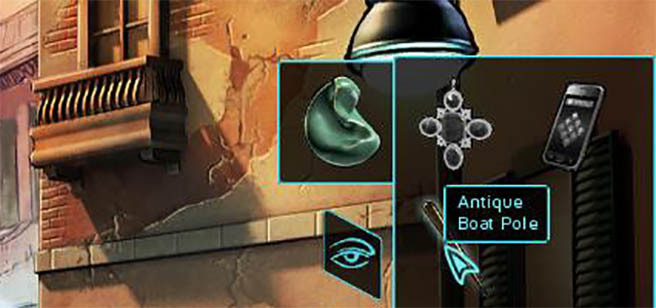
This is Moebius’ equivalent of Gabriel Knight 3’s “affix the cat hair moustache to your lip with maple syrup” or Silent Hill 2’s “make a handle by pouring wax over a hatch and attaching a horseshoe to it”. To make matters worse, there are people who believe that this is a way to go.
Recently I have read an article (plus comments) on Gamasutra praising this style of design, and I’ve nearly imploded. If we only had to point at one thing that killed the adventure genre, it’s exactly this: the necessity of second guessing the designer.
---
To be honest, adventure games suffer from many, many more problem than these seven sins -- so think of them as seven example sins rather than a definite list. Still looking at Moebius, one example could be the overload of boring activities. This is how many objects you can check out in just one room of the game:
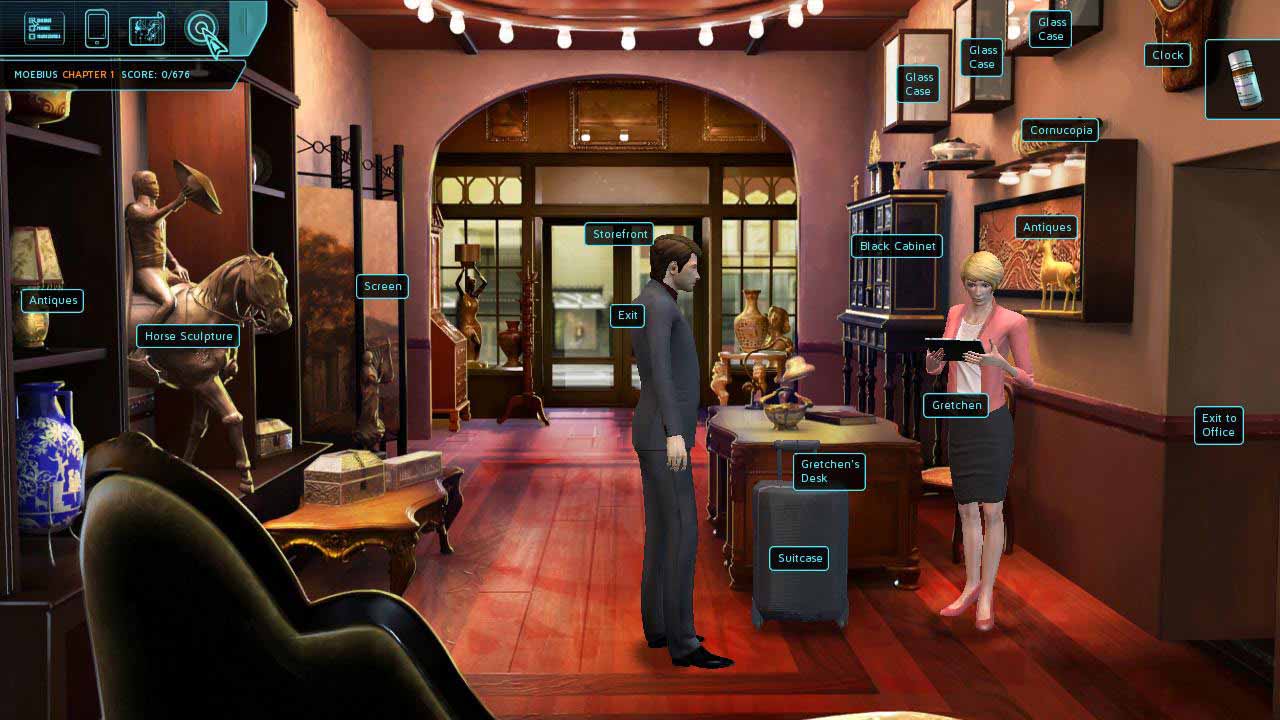
And every single description is flat and lifeless ("And old cabinet. I have seen my share of these."). Of course, this being a point and click adventure, you cannot allow yourself not to examine these objects, as every now and then one of them will turn out to be crucial to the progress.
---
So, Moebius features bad writing, lack of internal logic (things are not logical even within the slightly abstract rules of this particular world), low production values, bad UI, etc. etc. – but these things are not really the reason why adventures died (or, to be precise, went from mainstream to a niche).
Think about some of classic adventures you loved. They were clever, funny, and with – at the time – visuals to die for, weren’t they?
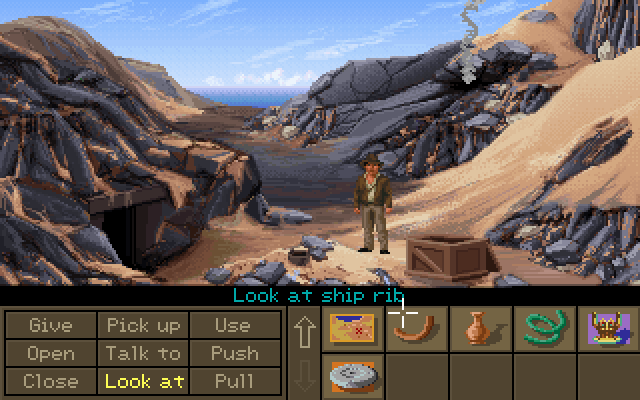
The problem is: the core mechanics of adventure games always were and will forever be anything but fun. Inventory management, option exhausting (aka “what have not I tried yet?”), backtracking, dialogue repetition, pixel hunting… Which one of these mechanics scream “fun” to you?
We loved the classics not because their game mechanics were great, but because some people managed to work around them, overshadow them with amazing writing and graphics, make them invisible and, in rare cases, useful.
But, again, the core mechanics were, quite simply, bad. Without the state of the art skinning (i.e. world class puzzles, story and/or graphics) that overpowered them, the skeleton of an adventure game is nothing but a rotten pile of ancient bones. That’s why, for example, the old-school adventure bits in The Walking Dead were used more as a palette cleanser than to provide for a truly exciting gameplay.
But that’s the problem. Because the core mechanics of adventures games are not fun, only a very few people in the world could and can make a great adventure game despite these mechanics standing in the way.
And I literally mean “a few”. Actually, at this very moment only one person comes to mind, and that is Dave Gilbert, the owner of Wadjet Eye Games and the creator of Blackwell, the only great adventure series since the golden years of Lucas Arts. I have just finished the final installment, Blackwell Epiphany...
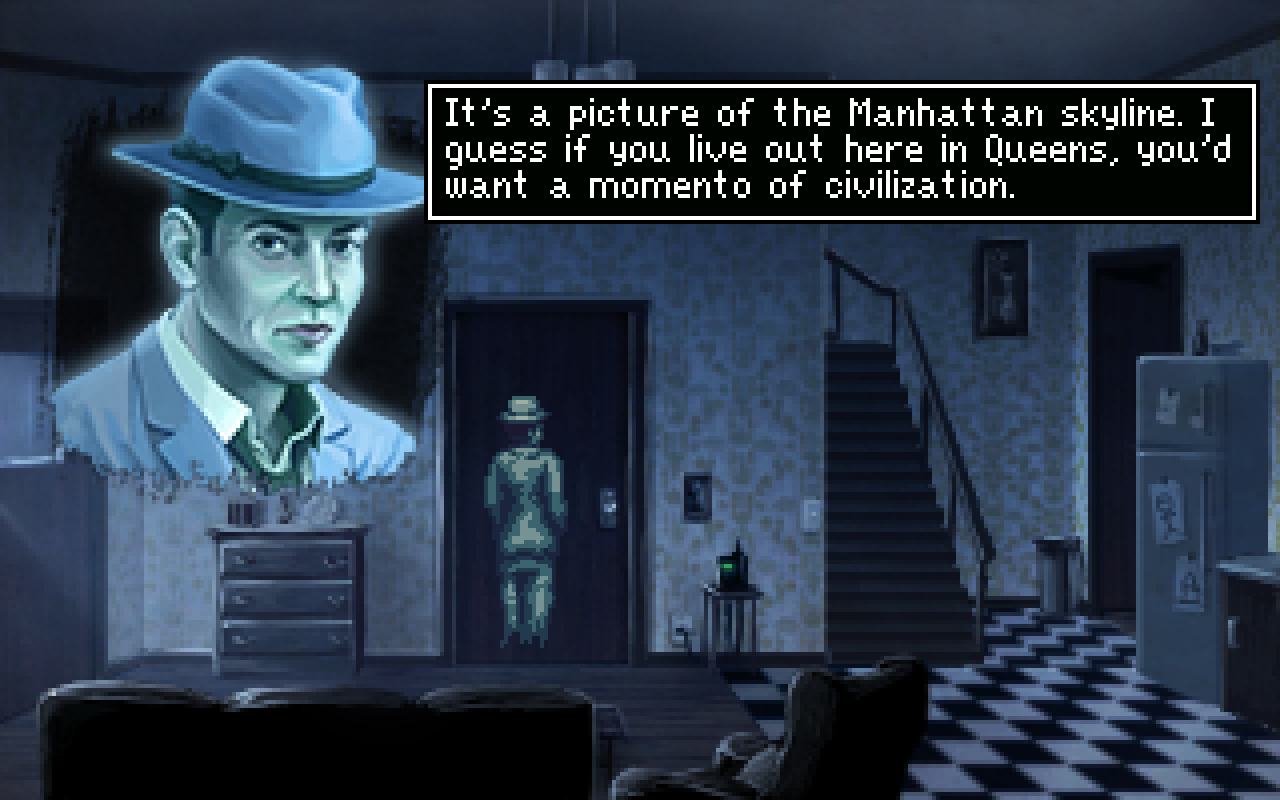
...and this is a perfect example of how a true talent can aikido the mechanics and not only make a great game despite them, but also find a way to turn their weaknesses into strengths.
However, if only a handful of creators can turn the counter-productive, immersion-killing mechanics into a spectacular adventure, can we consider this particular design model sustainable?
No, I don’t think so. If we stick to these tired, disgraced solutions, the adventures will never be more than a niche. An average movie can be fun, an average shooter can deliver excitement, but an average point and click adventure is a death sentence.
Making a “proper” adventure game using the current mechanics is possible, but incredibly hard. What Dave Gilbert does with Blackwell is, to me, a glitch in the matrix. And highly talented creators like Gilbert can make a great game out of anything anyway, just like a great painter can shock you with nothing but a piece of toilet paper and a lipstick – but I doubt you’d call them great painting tools.
And thus it is my belief we should never regret that the old school adventures died. They were mostly not that great in the first place, due to their irreparable mechanics, and I believe it’s high time to admit that. We need to treat the old school adventures like rotary dial phones. Amazing and useful at the time, but obsolete and useless nowadays – except to induce nostalgia.
Point and clicks will probably never die, as they are relatively easy to do and the audience is small, but loyal. And hell, just playing Blackwell made me want to make one more myself for some reason. But that’s just it, a niche hobby. A hobby that made a lot of developers avoid the word “adventure” even if the games they are making are exactly that.
But this is where I get to “not all is lost” part of this blog post.

Actually, I admit I lied a little when I said “it seems like the adventure genre desperately wants to stay dead.”
The truth is, we are surrounded by adventure games. It’s just that they are simply not called “adventures” anymore. Gone Home is not an adventure, but “a story exploration video game”. Heavy Rain is “an interactive drama”. The Walking Dead is “a Telltale game series”. Phoenix Wright is "a visual novel". The Vanishing of Ethan Carter is “a weird fiction horror”.
In reality, all of these games are adventure games. They are simply not relying on mechanics that are in the way rather than support the experience. The adventure games have not died, they have simply shape-shifted into multiple new life forms.
On the surface level, the creator of Blackwell does not agree with this…
Honestly, I think it’s silly to pigeonhole adventure games as being one specific thing. An adventure game is - at its heart - just another way of telling a story. Saying that the genre has mutated and been reinvented is like saying films have mutated. Or books. Or plays. Or television. None of those things have to made in a specific way to be “right”, and neither do adventure games. There are many different ways to tell a story, and there are many different ways to make an adventure game.
…but – even though I disagree with him on details (I do think that films, books, and television have mutated, especially when we look at what they were in their infant years), I think that in its essence we’re talking about the same thing: adventure genre has many faces, and that’s fantastic and highly inspiring.
As someone who believes that games are potentially the most powerful story-telling medium, I could not be happier. We live in exciting times, in times when we are re-inventing adventure games based on what the past taught us (please see our today’s post on Tumblr for an example of this new design approach), and I can’t wait to see where the next few years will take us.
I may have no patience or mercy for badly designed adventures that do not understand why their core mechanics do not work, but my love for stories experienced through video games only gets stronger with time, and, from what I can see, such is the case for a lot of fellow creators.
Adventure games are dead, long live adventure games.
Read more about:
Featured BlogsAbout the Author(s)
You May Also Like







.jpeg?width=700&auto=webp&quality=80&disable=upscale)








